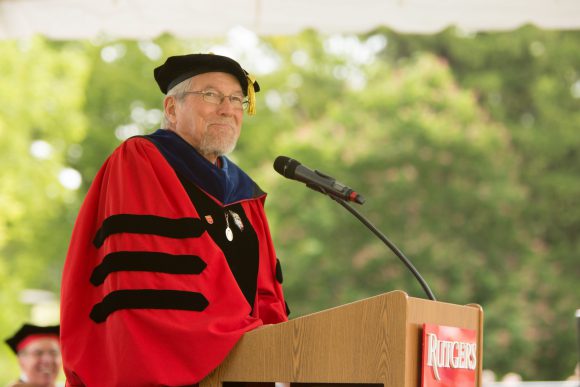
Executive Dean Robert M. Goodman.
For the past four years, you have learned and you have learned how to learn. You have been immersed in the search for new knowledge; you have learned and practiced the scientific method, based on empirical, evidence-based approaches, and you have applied these in your studies and to your life.
You have also been part of a culture that embraces transparency and civility, and one that is inclusive and nondiscriminatory.
You’ve been well-prepared to take your place as leaders in a society that has become global, and one in which technology pervades everything we know and do, and in which a future without science and technology is unimaginable.
Examples surround us of this fact, that science and technology, empirical and evidence-based, have become not just the cornerstone but the pervasive in our modern global society. Let me cite briefly three examples.
Science in the 19th century revealed that diseases were not caused by “vapors” but rather by specific individual or groups of micro-organisms and viruses that spread and sometimes caused major epidemics. From that fundamental, evidence-based empirical groundwork came modern medicine and public health, and vast improvements in human health, life expectancy, and well-being. The discovery of antibiotics right here at Rutgers from New Jersey soils, over there in Martin Hall, was a direct result. Similar research on immunity led to vaccines and other preventative measures – and also the discovery of vitamins.
Today’s frontier science includes studies of the human microbiome, the vast community of microbes found in the healthy human body. Fundamental science, evidence-based and empirical, is teaching us the remarkable roles that these previously unknown organisms play in our everyday lives and well-being. Your alma mater, Rutgers, is playing a leading role in this new era of microbiology, just as it did generations ago in the discovery of soil organisms that produce antibiotics.
Here’s another remarkable example of science and technology in the background that we completely take for granted in today’s world.
On this campus right now there are thousands of GPS devices, in your smart phones and in your vehicles.
In a recent essay, Robbert Dijkgraaf, the Dutch physicist and director of the Institute for Advanced Study in Princeton, reminds the reader that Albert Einstein published the first of his papers on the theory of relativity in 1905. After decades of further research and technology development, you today over a century later, carry and use—many of us many times a day—a device that would be useless—indeed dangerous—without knowledge of and the application of Einstein’s discovery.
How dangerous?
I quote, “the accuracy of the global positioning system (GPS) depends on reading time signals of orbiting satellites. The presence of the Earth’s gravitational field and the movement of these satellites cause clocks to speed up and slow down, shifting them by thirty-eight milli-seconds a day. In one day, without knowledge and application of Einstein’s theory, our GPS tracking devices would be inaccurate by about seven miles.”
So where am I taking you and what is my point?
Many of you likely know—and all of you should—that there’s been for some time – going back generations – a minor theme in our public discourse that denies the civilized world’s embrace of science and globalization. Rejection of empirical and evidence-based knowledge of how the world works, and how we have used that knowledge to make and do things that work for us.
That minor theme, denigrating and denying the results of the science and technology that underpin our society, our commerce, in fact, every element upon which modern society is built, is alas now daily fare. There has been serious erosion in public discourse of what former Congressman Rush Holt called “a reverence for evidence,” in his address here at our Convocation in 2014.
Think about this: Science, empirical evidence-based knowledge of how the world works, is the ultimate example of the power and importance of globalization. There are other examples where global thinking is essential to the peace and security—indeed the very future of human civilization: the climate system, the oceans and sea level, food security, the water cycle, air quality.
All of these issues and more go well beyond national boundaries. They are global issues. In my view, science is the “mother of all global human enterprises,” completely dependent for its continued performance as the key driver of human well-being on the health of the international order—and critically vulnerable to war, limitations on human migration, travel and communication amongst the world’s people.
The denial of science, hostility toward expertise and knowledge, disinvestment in funding of science and technological advances, and a turning-away from the power of globalism and inclusion, the free exchange of ideas, and indeed freedom of the press are extremely dangerous. And it’s my biggest worry about what you will face as you go out into this new world, with its new and urgent challenges.
Because, as it’s turning out, and as Steven Van Zandt told you yesterday, not only will your generation need to solve the many challenges facing humanity, much of which can only be addressed through commitment to empirical study and new thinking about governance, about social justice, and about taking collective responsibility for the future, but you will also need to face and overcome the increasingly prevalent view in society that science is optional, that expertise is elitist, that knowledge is merely a multiple choice menu to be selected from to fit into ones political, moral, or social world-view.
So as we bid you farewell, we must also caution you that the world in which you go forth to build your lives is going to be challenging and even treacherous.
I urge you to be true to what you know and to your convictions about the power of knowledge, the importance of expertise, the necessity of inclusivity and civility – all of those elements on which the functioning of modern societies are completely dependent.
You are prepared! You will prevail!
Good luck!!

